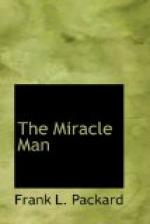And so Helena drove back to the Patriarch’s cottage that night, a little silent figure in the back seat of the wagon—and her hands were locked tightly together in her lap—and to her, as she drove over the peaceful, moonlit road, and under the still, arched branches of the trees in the wood that hid the starlight, came again and again the words of one who had gone, who perhaps knew better now—“you are as God made you.”
—XVI—
A FLY IN THE OINTMENT
The days passed. And with the days, morning, noon and night, they came by almost every train, the sick and suffering, the lame, the paralytics and the maimed—a steady influx by twos and threes and fours—from north over the Canadian boundary line, from the far west, and from the southernmost tip of the Florida coast. No longer on the company’s schedule was Needley a flag station—it was a regular stop, and its passenger traffic returns were benign and pleasing things in the auditor’s office. And it was an accustomed sight now, many times a day—what had once been a strange, rare spectacle—that slow procession wending its way from the station to the town, some carried, some limping upon crutches, all snatching at hope of life and health and happiness again. Needley, perforce, had become a vast boarding house, as it were—there were few homes indeed that did not harbor their quota of those who sought the “cure.”
But there were others too who came—who were not sick—who had not faith—who came to laugh and peer and peek. Pleasure yachts dropped their anchors in the cove around the headland from the Patriarch’s cottage—and their dingeys brought women decked out de rigeur in middy blouses and sailor collars, and nattily attired gentlemen whose only claim to seamanship was the clothes, or rather, the costumes that they wore.
They came laughing, supercilious, tolerant, contemptuous, pitying the inanity of those they held less strongly-minded than themselves who should be taken in by so apparent, glaring and monstrous a fake. They came because it was the rage, the thing to do, quite the thing to do, quite a necessary part of the summer’s itinerary. But that they, should they have been sick, would ever have dreamed of coming there was too perfectly ridiculous an idea for words. How strange a thing is the human animal!
They came in their rather cruel, merciless gaiety—and they left sobered and impressed; the ladies holding their embroidered parasols at a less jaunty angle; the men with lightened pockets, their names enrolled in the contribution book in that quiet, simple room, whose door was open, whose cash-box was unguarded, where none asked them to either enter or withdraw. They came and found no air of charlatanism such as they had looked for—only a peaceful, unostentatious, patient air of sincerity that left them remorseful and abashed. They came and went, a source of revenue not counted on or thought of before by Madison; but a source that swelled the coffers, brimming fuller day by day, to overflowing.




